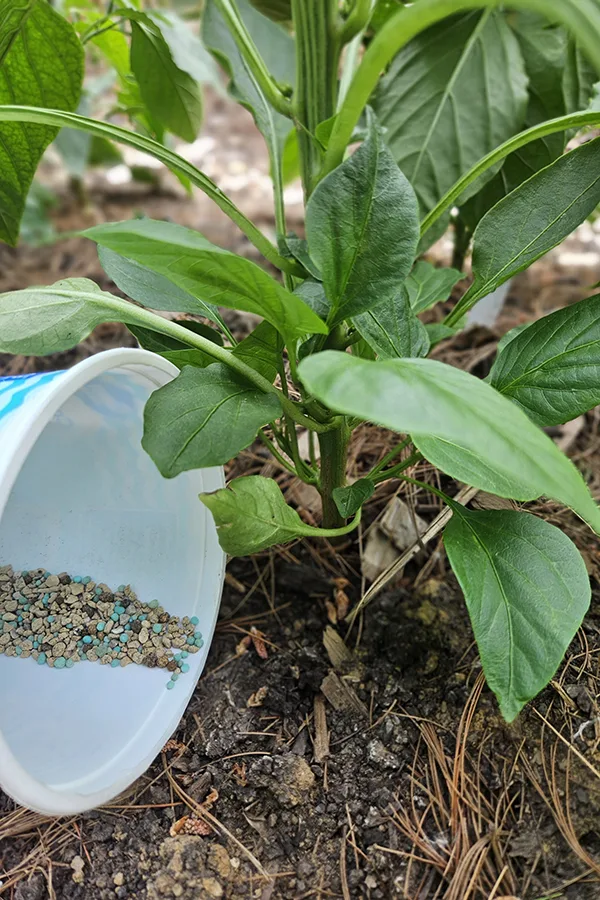Reveal the Best Fertilizers for Peppers: Necessary Nutrients for Prospering Plants
Reveal the Best Fertilizers for Peppers: Necessary Nutrients for Prospering Plants
Blog Article
Organic Vs. Synthetic Fertilizers: Which Is Best for Supporting Healthy And Balanced Pepper Plants?
In the world of nurturing healthy and balanced pepper plants, the selection in between synthetic and natural fertilizers stands as a critical decision with far-ranging implications. While both options objective to supply essential nutrients to sustain plant growth, the subtleties of their influence on the dirt, plant health and wellness, and the atmosphere spark a dispute that echoes throughout the gardening neighborhood. Recognizing the distinct advantages and possible risks of each fertilizer type is important for pepper farmers seeking to optimize their returns while maintaining an eco-conscious and lasting approach.
Benefits of Organic Fertilizers
Organic plant foods use a sustainable and environmentally-friendly strategy to beneficial pepper plants, providing necessary nutrients without the usage of synthetic chemicals. These natural plant foods are stemmed from organic resources such as compost, manure, bone dish, and algae, advertising soil health and wellness and biodiversity. Unlike synthetic plant foods, organic options release nutrients slowly, making sure a balanced and consistent supply for pepper plants to flourish.
One considerable benefit of organic plant foods is their capacity to improve soil framework and water retention. By enhancing dirt wellness, natural fertilizers advertise helpful microbial task, which assists in nutrient uptake by pepper plants. Additionally, organic fertilizers minimize the risk of chemical run-off, shielding water sources from contamination and safeguarding the environment.
Moreover, organic plant foods add to long-term soil fertility by advertising the development of useful soil microorganisms. These microorganisms help damage down natural issue, launching nutrients in a type that is conveniently available to pepper plants. best fertilizers for peppers. By cultivating a healthy dirt environment, natural fertilizers support lasting pepper growing practices that profit both plants and the environment
Downsides of Synthetic Fertilizers
Synthetic fertilizers, as opposed to their natural counterparts, pose numerous drawbacks when used to nourish pepper plants, affecting both plant wellness and ecological sustainability. One major disadvantage of synthetic fertilizers is their propensity to leach nutrients from the soil swiftly. This quick leaching can result in nutrient imbalances in the dirt, triggering plants to experience deficiencies or toxicities. Additionally, artificial fertilizers can hurt useful soil organisms, such as earthworms and helpful bacteria, interfering with the soil environment's balance.
Additionally, the overuse of artificial fertilizers can contribute to water contamination. Excess plant foods not soaked up by plants can clean away right into water bodies, leading to eutrophication, where algae flowers diminish oxygen levels in the water, hurting aquatic life. Additionally, artificial fertilizers are normally acquired from non-renewable sources, such as nonrenewable fuel sources, contributing to carbon discharges and environmental deterioration throughout their production.
Nutrient Absorption Comparison
When comparing artificial and natural plant foods in terms of nutrient absorption, natural plant foods have the benefit of offering an extra balanced and slow-release source of nutrients. Organic plant foods contain a variety of macro and micronutrients that are not only advantageous for the plants however likewise advertise healthy and balanced dirt microbial activity, which assists in nutrient uptake.
In addition, natural fertilizers enhance dirt structure and water retention capability, allowing pepper plants to access nutrients much more successfully. This enhanced soil top quality promotes root growth, enabling far better nutrient absorption. Artificial fertilizers, although at first enhancing plant development as a result of their high nutrient focus, might hinder long-term nutrient absorption by derogatory dirt health and wellness gradually.
Ecological Effect Considerations

On the various other hand, artificial plant foods, although commonly more quickly readily available and focused to plants, can have detrimental impacts on the atmosphere if not applied appropriately (best fertilizers for peppers). Their manufacturing calls for high power inputs, causing greenhouse gas exhausts and contributing to environment change. In addition, the runoff of excess synthetic fertilizers can contaminate water resources, leading to eutrophication and damaging aquatic ecosystems.
Best Fertilizer Practices for Peppers
To achieve this, it is necessary to adhere to finest plant food techniques tailored to the specific requirements of pepper plants. One essential method is click to read more to perform a soil test prior to applying any plant foods.
An additional vital practice is to fertilize pepper plants at the correct time. Typically, peppers profit from obtaining fertilizer at planting and after that once again when they start to flower. Over-fertilizing can result in nutrition imbalances and hurt the plants, so it is important to adhere to recommended application prices.
Furthermore, selecting a balanced plant food with an NPK ratio that fits pepper plants' needs is basic. Organic fertilizers, such as garden compost or manure, can be outstanding selections as they launch nutrients slowly and improve dirt structure in time. Nevertheless, synthetic plant foods can provide a fast nutrient increase when needed. Inevitably, integrating organic and artificial fertilizers sensibly can aid nurture healthy pepper plants while reducing ecological influence.
Final Thought

Organic plant foods supply an environmentally-friendly and sustainable approach to beneficial pepper plants, giving necessary nutrients without the use of synthetic chemicals. Unlike synthetic fertilizers, organic options launch nutrients gradually, making sure a balanced and constant supply for pepper plants to flourish.
Artificial fertilizers, in contrast to their natural equivalents, present different disadvantages when utilized to nurture pepper plants, influencing both plant health and wellness and ecological sustainability. When contrasting natural and synthetic fertilizers in terms of nutrient absorption, organic fertilizers have the advantage of providing an extra balanced and slow-release source of nutrients.In addition, organic fertilizers boost dirt structure and water retention capacity, permitting pepper plants to access nutrients much more successfully.
Report this page